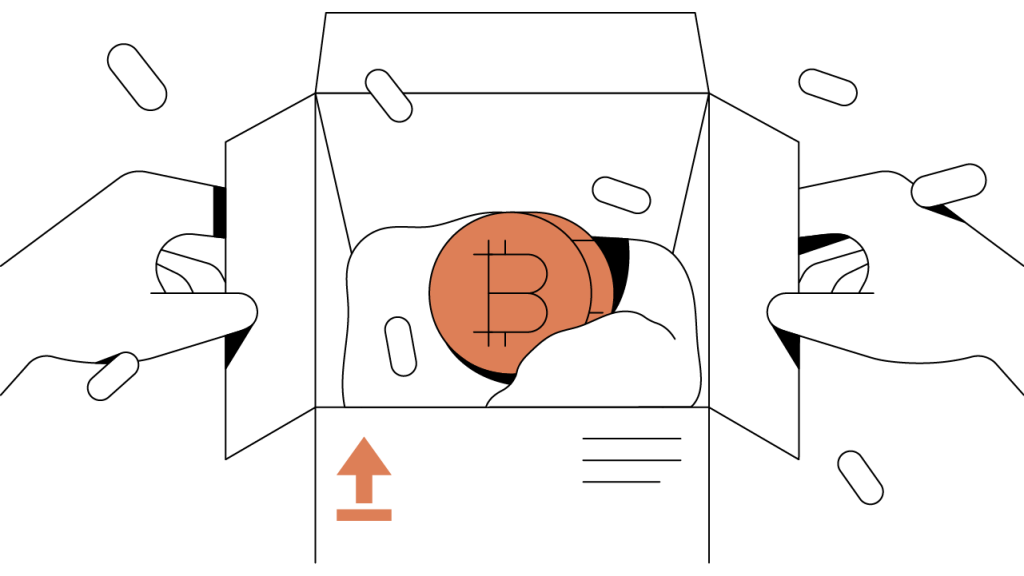Contents
wBTC: What Can You Do with Wrapped Bitcoin?
We discuss the range of new services that bitcoin holders can access because of the wrapped bitcoin protocol.
Updated October 4, 2023 • 3 min read

Summary
Wrapped bitcoin (wBTC) is an Ethereum-based token that has been created from bitcoin (BTC) in a 1:1 relationship that can be used on Ethereum’s growing ecosystem of DeFi applications. With wBTC, bitcoin holders can engage in lending, yield farming, margin trading, and other hallmarks of decentralized finance (DeFi).
Why Use wBTC?
Decentralized finance (DeFi) has exhibited remarkable growth on the Ethereum blockchain, and wrapped bitcoin (wBTC) provides interoperability between Bitcoin and Ethereum, allowing bitcoin holders to participate in Ethereum’s burgeoning ecosystem. The wBTC protocol converts bitcoin into a wBTC token on Ethereum that can be used on decentralized exchanges (DEXs) and decentralized applications (dApps) running on Ethereum.
A Quick Recap
The wBTC protocol was launched in January 2019 as a way to bring the liquidity of bitcoin to the Ethereum network. Within 18 months of its launch, more than $800 million worth of bitcoin was converted into wBTC.
The wBTC protocol is currently controlled by a decentralized autonomous organization (DAO), that consists of 17 stakeholder members within the DeFi space. According to the wBTC website, there are more than 40 participants — including DAO members, wallets, merchants, and exchanges — in the wBTC ecosystem as of December 2020.
To acquire wBTC, a bitcoin holder makes a request to a merchant, such as Airswap, CoinList, 0x, AAVE, or Maker. Converting bitcoin into wBTC typically comes without a cost, but when converting wBTC back into bitcoin, merchants generally charge a fee. Users of wBTC also accrue Ethereum gas fees as they transact within the DeFi ecosystem. Now let’s find out what you can do with wBTC tokens.
Collateral for Crypto Borrowers
DeFi platforms that facilitate the lending of cryptocurrencies require borrowers to secure their loans with collateral. What this means in practice is that a certain amount of cryptocurrency is held on the platform for a period of time until the borrower repays their loan.
Before wBTC came into existence, collateral was typically paid in ether (ETH), Ethereum’s native cryptocurrency. Today, the majority of DeFi platforms are built on top of the Ethereum blockchain. However, maintaining a single cryptocurrency as collateral may expose users to a greater risk of price volatility. Wrapped bitcoin allows for other digital assets (e.g., bitcoin), uncorrelated to ETH or the broader Ethereum blockchain, to be used as collateral.
As of December 2020, protocols that allow for wBTC to be used as collateral to borrow digital assets include:
MakerDAO
Compound
Kyber Network
AAVE
Uniswap
Balancer
Earning Interest and Yield Farming
Platforms like the above protocols allow lenders to earn interest on the wBTC that they offer to borrowers through money markets and liquidity pools. Most of the lending/borrowing platforms use an algorithm that adjusts based on supply and demand to determine interest rates.
For example, the interest rate for lending wBTC in a wBTC pool on Compound in December 2020 is just below 3%. Compared to the interest you make on a savings account at a traditional bank — about 0.01% — the interest rates offered by DeFi platforms tend to be significantly higher. Yield farming refers to the process of jumping from crypto pool to crypto pool or DeFi platform to DeFi platform in an effort to maximize interest gained on loans.
Governance Tokens
Some DeFi platforms — including Compound and Synthetix — have further incentivized lending and borrowing by allowing both parties to accrue the platform’s governance token.
On Compound, for example, lenders and borrowers receive the native COMP token, which accrues according to usage of the Compound platform. Not only are COMP tokens fungible, meaning holders can exchange them for other crypto, but they also allow platform users to vote on protocol upgrades and lending/borrowing mechanisms.
The process of earning a secondary token in addition to interest is referred to as liquidity mining, and wBTC provides the first opportunity for bitcoin holders to participate in this new frontier of decentralized finance.
Margin Trading Wrapped BTC
Using Fulcrum, for example, a decentralized application on the bZx protocol, wBTC holders can margin trade ETH, stablecoins, and ERC-20 tokens.
Margin trading can get complex, but the basic idea is borrowing money to trade with. Executing a trade with more at stake may yield better returns if it’s successful, but the converse is equally true, and you can lose significant amounts of your money. That’s why margin trading is often better suited for experienced traders. You can both go long (profit from a rise in price) and go short (profit from a fall in price) with margin trading. You can also simply lend your digital assets to the protocol to give to others who are margin trading and earn a fee.
Wrapped bitcoin has unlocked a large store of liquidity to the DeFi ecosystem and already exhibited utility and delivered value across Bitcoin and Ethereum since its launch in 2019.
Cryptopedia does not guarantee the reliability of the Site content and shall not be held liable for any errors, omissions, or inaccuracies. The opinions and views expressed in any Cryptopedia article are solely those of the author(s) and do not reflect the opinions of Gemini or its management. The information provided on the Site is for informational purposes only, and it does not constitute an endorsement of any of the products and services discussed or investment, financial, or trading advice. A qualified professional should be consulted prior to making financial decisions. Please visit our Cryptopedia Site Policy to learn more.

Is this article helpful?


